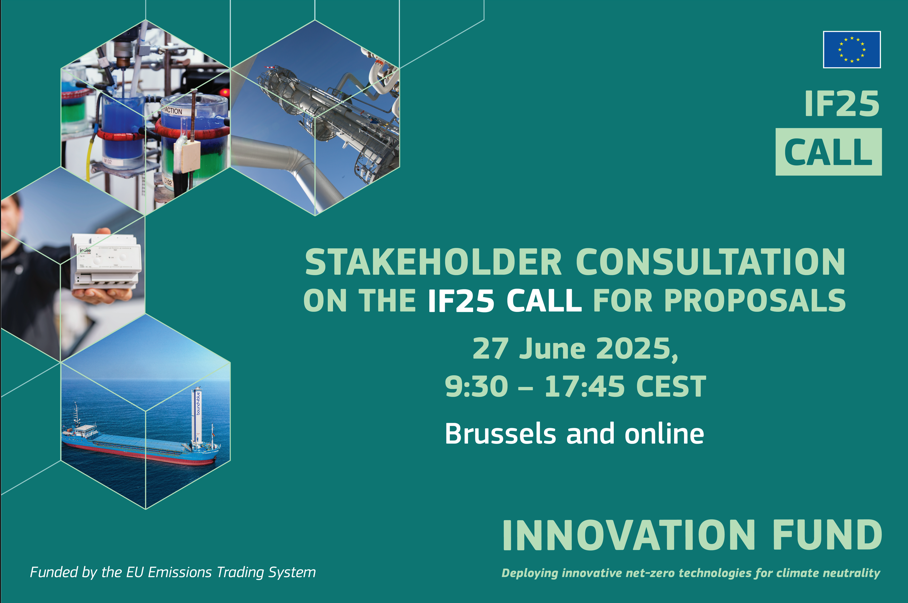27 June 2025
Summary
The Innovation Fund Stakeholder Consultation Event, held on 27 June 2025, presented the European Commission’s initial considerations for the upcoming IF25 Calls for Proposals. The session provided an overview of the Innovation Fund’s strategic priorities for the next round of funding, highlighting key focus areas such as large-scale decarbonisation, scalability of solutions, and alignment with the EU’s broader climate and industrial policies. The event also covered planned improvements to the application process and funding mechanisms. This document summarises the main points shared during the session, including the preliminary call design, expected focus areas for project selection, and next steps for stakeholder engagement, such as the open survey to collect further input on the IF25 Calls.
Core themes and announcements
IF25 strategy and policy alignment
The IF25 Calls will further align with the EU Green Deal, REPowerEU, and the Fit for 55 package, intensifying the focus on energy independence, strategic autonomy, and deep decarbonisation.
A renewed emphasis is placed on high-risk, high-impact technologies with strong scalability potential, supporting industrial transformation and EU cleantech manufacturing.
Key novelties in the IF 25 call design
Introduction of new financing instruments
The Commission aims to broaden the financial toolkit beyond traditional grants, introducing:
- Fixed premium mechanisms (e.g., for industrial heat decarbonisation)
- Auctions for hydrogen and heat, inspired by H2Global
- First-of-a-kind equity and debt instruments via partnerships with InvestEU and the EIB
New call structure
The IF25 will consist of multiple thematic windows:
- Renewable hydrogen
- Industrial electrification
- Carbon Capture, Utilisation and Storage (CCUS)
- Energy-intensive industries
- Mobility (including aviation, maritime, and heavy-duty road transport)
Project maturity differentiation
Two distinct categories will be defined:
- Early-stage innovative pilots (TRL 5–6)
- Demonstration projects (TRL 7–9)
This structure is intended to lower the entry barriers for breakthrough innovations.
Stakeholder feedback highlights
Simplification and transparency
Stakeholders urged simplification of the application process, particularly for SMEs. Concerns were raised about:
- Administrative burden
- Scoring clarity
- Benchmarks for GHG reduction and cost-efficiency
The Commission committed to clearer guidance and streamlined evaluations, particularly for small-scale projects.
Support to project development
More Project Development Assistance (PDA) will be made available to support:
- Early-stage high-potential proposals
Regions with limited historical Innovation Fund participation
Renewable energy and storage
Focus areas include integration of renewables with flexibility solutions:
- Hybrid solar-wind plus storage
- Industrial-scale batteries
- Thermal energy storage systems
Hydrogen and CCUS
Key developments:
- Larger auction rounds for renewable hydrogen
- New window for hydrogen infrastructure and storage hubs
- Increased emphasis on CCUS industrial clusters and cross-border collaboration
Industrial heat decarbonisation
The 2025 Pilot Heat Auction will allocate up to €1 billion through fixed premium contracts. Target technologies include:
- High-temperature heat pumps
- Electric boilers
- Microwaves
- Solar thermal systems
A dedicated webinar is scheduled for 9 July 2025 to outline conditions.
Just transition and regional impact
Evaluation will increasingly consider:
- Regional equity
- Job creation in cohesion and coal-dependent regions
- Local supply chain resilience
International cooperation and supply chain security
Calls will prioritize projects that:
- Strengthen EU manufacturing for key cleantech (batteries, electrolyzers, semiconductors)
- Reduce external dependencies
- Foster EU’s open strategic autonomy
New operational updates from the June 27 session
GHG performance requirements
Projects must achieve at least 75% of the GHG reduction forecast in their Grant Agreement to receive full payment.
Budget recycling and coordination challenges
- Budgets from terminated projects will be reinvested into future IF auctions.
- Misalignment between EU Hydrogen Bank auctions and IF timelines may pose challenges. The EU evaluates projects, but funding and implementation responsibilities lie with Member States.
- Public consultation is open until late July 2025
- Draft call texts will be published in Q3 2025
- Official launch of IF25 expected in Q4 2025
- Stakeholders are encouraged to attend the upcoming July webinars and provide final feedback
For more information, please visit event´s website.



